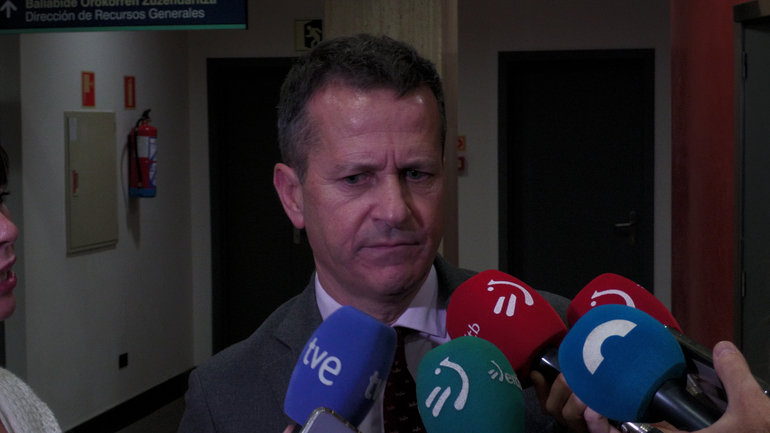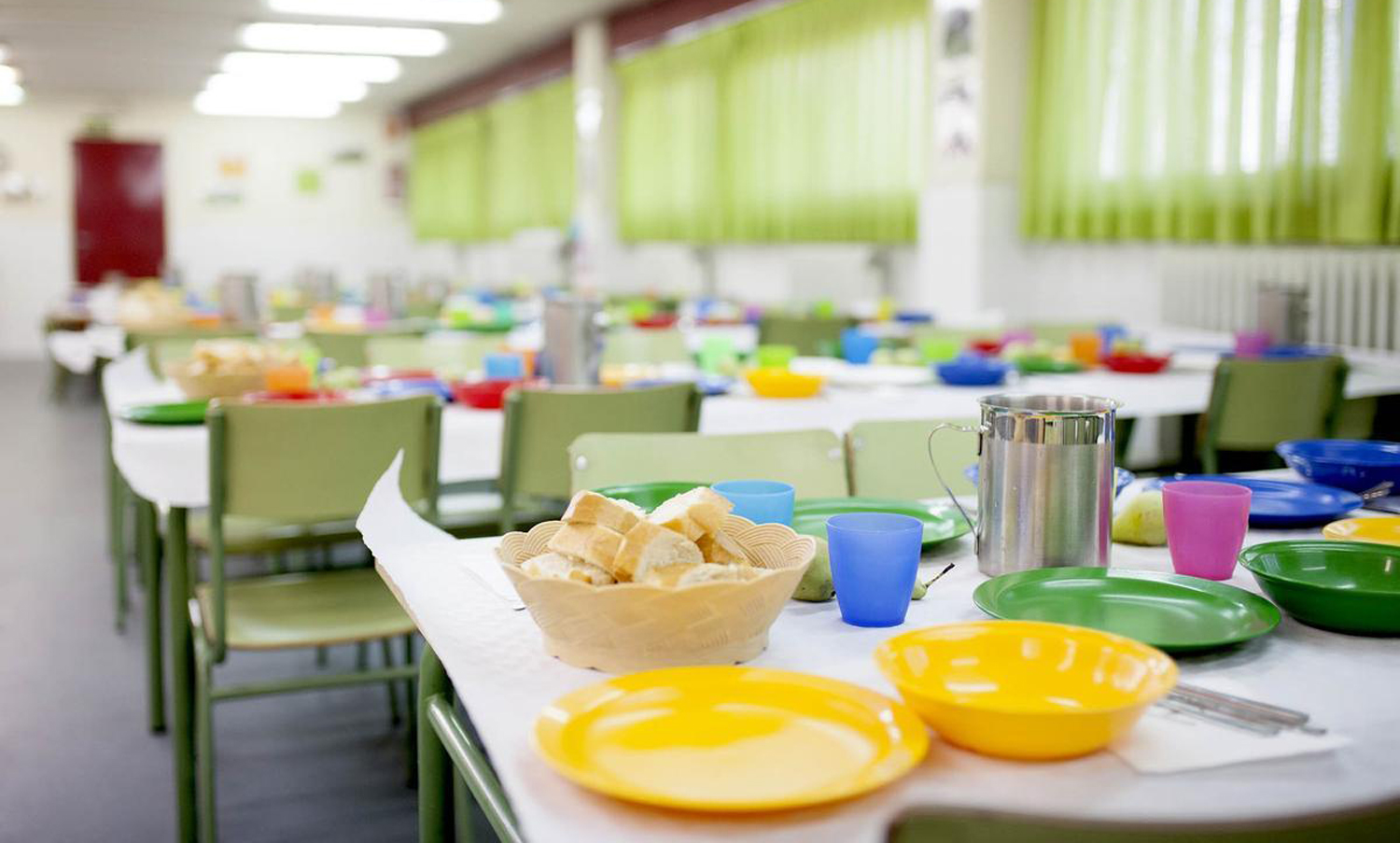School canteens, who is responsible?
- Recover kitchens, ensure adequate food, transmit educational values. There are many demands of educational agents to improve the services of canteens. They are not satisfied with the model managed so far by the large catering companies, but nor with the proposal of the Department of Education of the Basque Government in January: As of the 2019-2020 course, the CAV parent associations who wish to do so will be able to directly manage the dining room service of the center.

The management model for school canteens was launched in 2000 and has been put in place until now. In these times, most centers did not offer a dining room service. That is why the objective was for the dining room service to reach as many centres as possible. Twenty years later, many educators question the model that works through large catering companies, and have repeatedly called for the change to the Basque Government. In fact, driven by the Basque Government, a follow-up commission was launched in December 2017, which agreed among them the proposals it raised to the Department of Education. Now, they've been "stunned" by the "one-sided" decision of the Department of Education.
“We have very little information. For example, the calls for grants do not give any certainty, and we do not know the amount of the subsidy,” said Lurdes Imaz, coordinator of the Association of Parents EHIGE. They look carefully at what may come: “All management would be left to the associations of mothers and fathers, and we do not think it is appropriate. The dining room is a public service, so the Basque Government should assume its responsibility”.
ELA Member Pello Igeregi also strongly criticised the proposal: “We believe that the intention of the Basque Government is that the alternative management of school canteens should fail. That is why it has placed all the responsibility on the associations of mothers and fathers, without any help and resources from it”. He added that the Basque Government knows – because it has done pilot tests – that such an approach is costly and complex: “Giving all the responsibility to parents, your intention is to send the devil the school dining model based on healthy local foods.”
Most educational agents agree that the catering service should be within the educational community and that people working in school canteens should be given an educational character.
However, there are
other benefits that can benefit parent associations in the integral management of canteens. Berton Bertokoa is a project created by parents of educational centers in the Peters, concerned about the quality of the food given to their sons and daughters in school canteens. They have been calling for years for the need to have their own kitchens in the district's dining rooms and building their own service to promote local food. “These schools have shown that our model is effective. It has been shown that outside the catering system, and without any additional financial cost to parents, it is possible to give our children a healthy diet.” They are therefore clear that the leaders of the Basque Government have had to assume that the model they have put forward has alternatives.
They have identified some shortcomings in the Government ' s proposal, as they are clear that the full management of school canteens cannot be left to the mother and father associations: “The composition of the Associations of Fathers and Mothers is variable, so their decisions can call into question the stability required by the management of the canteens”. Furthermore, they consider that both surveillance and cooking services should be under the responsibility of the administration.
The Bekobenta School in Markina-Xemein is one of the four public education pilot projects launched by the
Basque Government. The project was launched in 2016 and are now concerned about the proposal made by the Department of Education: “It’s been an ordago, they don’t want these kinds of projects to go ahead, and that’s what’s worth in the board games, but here we’re talking about feeding our children.” Zuriñe Egia, coordinator of the Bekobenta dining room committee, recalled that they have been at the sectoral table talking to the Basque Government and believes that the decision has now been taken by the administration "without heeding its words and unilaterally".
Egia stressed that they are very pleased with the pilot model put in place: “We offer quality food to our children at no extra cost.” But, having listened to the Basque Government’s proposal, they are afraid: “We’re afraid, we don’t know what will happen after the pilot test. We should already start preparing the next course menu and getting food, but we don’t know what’s going to happen with models like ours and we’re paralyzed.” It believes that this proposal has been "a way of justifying" by the Basque Government.
With the current model, they say
that it would be “almost impossible” to integrate the dining room service into the educational community. In fact, large catering companies only distribute in the schools the food prepared in the industrial kitchens, but they add that with the model proposed by the Basque Government it would be “impossible”. And most of the educational agents agree that the dining room should be within the educational community and that the people who work in school canteens should be given an educational character. “We believe it is necessary to include the school dining room in the center’s educational projects, explaining its educational content and maintaining consistency with the rest of the project,” says the Berton Bertokoa project. School canteens and children's meals are part of early childhood education, which should be directly reflected in the curriculum: “Children’s education and meals cannot be treated as a special issue.”
Members of the ELA and STEILAS trade union are also clear about this. “The dining room has to be within the plan of the center because it is an educational space and allows to address issues such as the care and self-care of students, healthy and sustainable food and local food,” said Ana Pérez, a member of STEILAS. Pello Igeregi of ELA also spoke along the same lines: “We believe that food is part of education because on the one hand it is an opportunity to internalize healthy eating habits for our sons and daughters and on the other, because food sovereignty to care for the environment is a very important element and it seems essential to us to convey this value to children so that they can live on a habitable planet in the future.”
Lurdes Imaz sets as an example Catalonia: “In Catalonia the pedagogical area is very much worked out. They take into account, for example, that half of the staff in the dining room are male, in order to break stereotypes.”
.jpg)
Leaving in the
hands of the associations of mothers and fathers the integral management of the canteens can have consequences on the working conditions of the caregivers and the servers of the canteens. That is what the trade unions are concerned about. “This issue has shown that the Basque Government cares a hard staff,” says Igeregi. It denounces that no reference is made to the consequences of the change of model and recalls that in other models they have impaired workers' labour rights: “We believe that the dining room should be integrated into pedagogical projects, in order to do so, the working conditions of the workers who work should be the right ones and cannot be put in place by dismissing the workers who currently work”. In Pérez's words, one must also be careful: “At the moment there is a great lack of definition, but it is clear that personnel management cannot remain in the hands of families.” This proposal represents a further step in the subcontracting and privatization of public education, which leaves workers “in exclusion”.
Moreover, the educational value of the work can directly influence the working conditions: “The training and working conditions of workers are fundamental, as in addition to serving food, transmitting these values and others will be their direct responsibility,” Igeregi explained. However, it believes that the transition to another model should be assured that current workers will continue to work: “To do so, a transition process should be designed. Pilot tests have been carried out in some schools, but often without regard to the working conditions of the workers.”
They insist that canteens are a public service. EHIGE spokesman Imaz stressed that the dining room must necessarily be public, so the recruitment of workers must be the responsibility of the Basque Government. The members of the Berton Bertoko project also agree that it is the task of the administration, for example, to train staff in school canteens on issues such as nutrition or the origin of food.
In the case of the Bekobenta school, some workers are hired by the Basque Government and others by the AMPA: “In our case, the cook hires the public administrations and we outsource the caregivers through another company,” explains Zuriñe Egia. He stressed that leaving all responsibility for hiring in the AMPA would influence the working conditions of workers.
Fed up with the consequences of subcontracting, the workers of private school canteens have called for a strike on 26 February, demanding the same conditions as the cooks of the Department of Education. The main objective is to achieve type-approval, but they have stressed that they are also very concerned that the catering service is given to associations of fathers and mothers. The workers have denounced that this is a proposal that has been made "without any foundation".
Beyond the dining model
managed by the large catering companies, several attempts have been made in the Basque Country. Many of them are based on international models. Imaz has explained that the initiative Seguro Platera aukera, promoted by the Association of Parents EHIGE, has known different models: “In the Canary Islands, for years, the Department of Agriculture and Education has collaborated with the objective of offering local and quality products in schools.” There is also a great awareness in the French State, and there are many dining rooms that provide local organic food, that look at the educational model and ensure that children learn from where the food comes from.
The centres of Larrabetzu and Erandio are pioneers among them who have launched the new models on their own. But Pérez says that there are few models in Euskal Herria, because the Department of Education from the very beginning puts obstacles: “For example, subsidies to schools that did not accept direct management were removed, i.e. they were condemned. Despite the obstacles, some continued; Larrabetzu's will be one of the best known, but little by little other centers have also emerged from the imposed model. They work with farmers in the area and consume nearby and seasonal produce.” The STEILAS member believes that if the Department of Education prioritizes management through catering companies, small businesses should also be given the opportunity: “If you need to have the possibility to cook 8,000 menus a day, the small and nearby companies have nothing to do in this competition.”
In the same vein, the EHIGE coordinator has spoken. In his opinion, with some changes that can be easily made, indigenous products can be offered in the dining rooms: “For example, giving a higher score to companies that offer local products in bidding.” He recalled that the current model has served to universalize the dining room service, but that we are facing a period of transition and change. Zuriñe Egia also agrees: “To this end, I consider it necessary to put kitchens in schools that do not have kitchens and to offer small catering companies the opportunity to compete.”
























